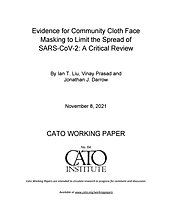Evidence for Community Cloth Face Masking to Limit the Spread of SARS‐CoV‑2: A Critical Review
Of sixteen quantitative meta‐analyses, eight were equivocal or critical as to whether evidence supports a public recommendation of masks, and the remaining eight supported a public mask intervention on limited evidence primarily on the basis of the precautionary principle.
The use of cloth facemasks in community settings has become an accepted public policy response to decrease disease transmission during the COVID-19 pandemic. Yet evidence of facemask efficacy is based primarily on observational studies that are subject to confounding and on mechanistic studies that rely on surrogate endpoints (such as droplet dispersion) as proxies for disease transmission. The available clinical evidence of facemask efficacy is of low quality and the best available clinical evidence has mostly failed to show efficacy, with fourteen of sixteen identified randomized controlled trials comparing face masks to no mask controls failing to find statistically significant benefit in the intent‐to‐treat populations. Of sixteen quantitative meta‐analyses, eight were equivocal or critical as to whether evidence supports a public recommendation of masks, and the remaining eight supported a public mask intervention on limited evidence primarily on the basis of the precautionary principle. Although weak evidence should not preclude precautionary actions in the face of unprecedented events such as the COVID-19 pandemic, ethical principles require that the strength of the evidence and best estimates of amount of benefit be truthfully communicated to the public.

